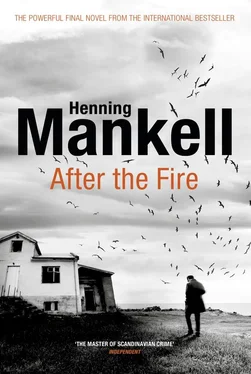She abruptly turned and glanced at the hill up which Lisa Modin had recently disappeared, and at the little side road leading to her house and my car. She was afraid of something. It could only be people, surely?
I went down to the boat. During my many years as a doctor I often encountered those who were afraid — every single day, in fact. I spent several weeks one summer working on a temporary basis in the oncology department of one of the largest hospitals in the country. There was a spate of illness among the other doctors in the department, which meant that for ten days I was the one who had to deliver the gravest news to a series of patients. I remember one young man particularly clearly; he had woken up one morning with a stiff neck. He was examined by an orthopaedic specialist who suspected it could be something more serious, and a scan had led to the correct diagnosis.
There I sat, with the results in front of me. The stiff neck was a serious, probably incurable cancer. The primary tumours were in his left lung, and the pain in his neck was a metastasis lurking in one of the vertebrae at the top of his spine. And now I had to deliver the news. The notes informed me that Sven Roland Hansson was born in 1951, which meant he was nineteen years old. In 1970 the chances of curing cancer were still extremely limited. Today six out of ten cancer patients survive. In 1970 the figure was probably only three or four.
As I called him in from the waiting room, I knew that I would probably be giving him a death sentence. In such situations it was normal practice to have an experienced nurse present; I had asked a sister who had worked in the department for many years to sit in with me.
Sven Roland Hansson was what we might have called a bit of a misfit back then. He was wearing a green jacket and scruffy jeans. He regarded me and the nurse with distaste, making it clear that he was in a hurry and really didn’t want to sit down when I offered him a chair.
I had asked the nurse how I should approach the diagnosis, and she had told me to get straight to the point. If something was serious, there was no ‘kind’ way of saying it. The important thing was for the patient himself to understand that the doctor sitting opposite him was treating his fate with the gravitas it deserved.
There would be a whole programme of further investigations before the medical team decided on the best course of treatment. That wasn’t really anything to do with me because I didn’t have the specialist knowledge; I was only here because of a desperate shortage of doctors.
Eventually Sven Roland sat down. I could see that he was starting to feel afraid. It was obvious that he had only just realised the significance of the fact that he was in the oncology department.
Slowly and carefully I explained the seriousness of his illness. The colour drained from his face. He understood.
Suddenly he began to scream. It was as if someone had burned him, or stabbed him. I have never heard anyone scream like that, neither before nor since. That is why I will never forget it. I had seen those who were suffering greatly die in a silence suffused with fear; I had heard people groan with pain, but I had never seen a metamorphosis like this one. He was yelling so violently that his chewing gum flew out of his mouth and landed on my white coat. I didn’t know what to do, but fortunately the nurse stepped in. She took his hand, but he pulled away and carried on screaming. Then she took a firm grip of his shoulders as if he were a small child and shouted to me, telling me to give him a sedative.
A year later I happened to notice his name in a newspaper. In those days it was uncommon for anything other than a black cross to appear in a death notice, but Sven Roland Hansson’s little box was adorned with a guitar.
I had a friend who specialised in treating drug addicts. He played the guitar, and he informed me that the picture showed a Telecaster, one of the most important electric guitars ever made.
I thought I had seen something of Sven Roland Hansson’s fear in Oslovski’s face. Those frightened eyes told the same story.
I started the engine and slowly made my way out of the harbour. Oslovski was standing up on the road trying to hide behind a tree as she watched me leave. I pretended I couldn’t see her and increased my speed as I passed the outer pier. When I glanced back over my shoulder, she had disappeared.
Perhaps it was the cold, perhaps it was Oslovski’s fear, but I shivered. I tucked my chin inside my jacket and set a course for my island.
As I rounded the headland I saw someone standing on the jetty with his arms wrapped around his chest to keep warm. At first I thought it was Alexandersson and his colleague, but where was their boat?
Then I realised it wasn’t a man waiting for me; it was my daughter Louise. In the midst of my astonishment I understood that it was she who must have been on board Jansson’s boat when I was on my way back to the mainland with Lisa Modin.
I don’t like being surprised by unexpected news or visits. Harriet had completely floored me one day by informing me that Louise was my daughter. I never doubted that it was true, nor did Louise even though we bore no resemblance to one another. I could see Harriet in her face and perhaps something of my father’s features.
She did not have my build, nor Harriet’s. She was strong and sturdy. If we got into a physical fight, I was pretty sure Louise would win. At the same time she was a very attractive woman. When we were in town or at a cafe, I had noticed that men turned to look at her when she walked by.
I didn’t really understand what made her tick. She was a closed book, so much so that I was always ready for her to do something unforeseen. I had tried to get used to the situation, but without success.
Her sudden departures also irritated me, as did the fact that she never told me when she was planning to return. All she had said on the phone when I told her about the fire was that she would come. Not a word about where she would be coming from or when she thought she might appear.
I chugged into the boathouse. Before I had time to fasten the mooring ropes she flung open the door. The sunlight dazzled me, and I saw her only as a black shadow framed in the doorway.
She came towards me and we embraced. Her face was wet against my cheek. She was crying, or she had been.
We went outside. I had a lump in my throat and was afraid I might break down. That was one thing we had in common at least: we were both mourning the old house.
As usual Louise had very little luggage with her, just a small brown case. She always had more baggage when she left than when she came back.
We put the case in the caravan, then continued up to the site of the fire. Catching sight of Louise from behind, I had the feeling that it was Harriet walking in front of me.
That surprised me because Louise and Harriet were so fundamentally different. Was it an illusion? I stopped to look at her. Louise immediately turned around, and I caught up with her. The apple tree resembled a stage prop made of black crêpe paper.
‘When you weren’t here I thought you’d got in your boat and simply headed out to sea, but Nilsson said he’d seen you sailing towards the mainland as we were on our way over.’
‘Jansson. Not Nilsson.’
‘Jansson. Did I say Nilsson?’
‘Yes.’
‘He was the one who sang so beautifully on Mum’s last birthday.’
‘How did you get hold of him?’
‘I got off the bus down by the harbour and asked the driver. He’s the one who was called Nilsson. He called Jansson, who promised to pick me up right away. There was something odd about the bus, incidentally.’
‘Oh?’
‘I was the only passenger.’
Читать дальше












